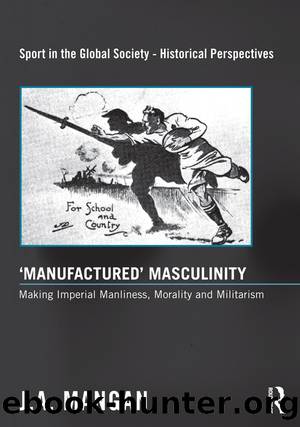'Manufactured' Masculinity by J. A. Mangan

Author:J. A. Mangan [Mangan, J. A.]
Language: eng
Format: epub
Tags: History, Military, General, Modern, Civilization, Essays, Social History, Sports & Recreation, Cultural & Social Aspects
ISBN: 9781317984771
Google: 8DrJBQAAQBAJ
Publisher: Routledge
Published: 2014-01-02T16:01:15+00:00
Imitating Their Betters and Disassociating from Their Inferiors: Grammar Schools and the Games Ethic in the Late Nineteenth and Early Twentieth Centuries [1]
I
The mid-nineteenth century was a time of educational stocktaking. Reflection, reform and re-organization were the order of the day. Between 1860 and 1870 three commissions reported on the condition of English schools â the Newcastle Commission on the state of popular education, the Clarendon Commission on the state of âpublic schoolsâ and the Taunton Commission on the state of the remainder.
The Taunton Commission, appointed in 1864, and which reported in 1868, will mostly concern us here for reasons which if not already obvious, will soon become apparent. It found in existence some 572 grammar schools, the legacy of Tudor England, and some 10,000 private schools. Standards were generally low. The outcome of the commissionâs report was the Endowed Schools Act of 1869. By it commissioners were appointed to revise the educational trusts of some 3,000 schools. [2] In time secondary education was transformed.
The work of the commissioners revitalized the grammar schools including two which I will examine shortly â Ripon and Bristol. For this reason, these contrasting schools exemplify, sharply and clearly, developments characteristic of the evolution of the grammar school in the late-nineteenth and early-twentieth centuries; an evolution concerned in large measure with emulating superiors and distancing themselves from inferiors. In this process, as we shall see, games and games fields were the expensive symbols of social ambition.
The reformation of abused school constitutions and the creation of viable institutions undertaken by the Charity Commissioners [3] took time. Only half the work was accomplished by 1884: 595 schemes had become law, but 660 schools were still unaffected â âEven as late as 1895 the Leeds Grammar School was not working under a revised schemeâ. [4] In the case of my exemplars Ripon was reformed in 1872 and Bristol in 1874.
Legislation enacted under the various schemes provided revenue which aided the survival of the grammar schools and to an extent allowed them to develop the facilities mentioned earlier, but the roots of emulation, segregation and ambition which ensured attention to these facilities often lie deeper in the schoolsâ histories than the last 25 years or so of Victoriaâs reign. In some instances they had considerably earlier origins. Associated logically with these facilities is the development in these schools of the so-called games ethic â the subscription to the belief that important expressive and instrumental qualities can be promoted through team games (in particular loyalty, self-control, perseverance, fairness and courage, both moral and physical). This is my central concern. In concentrating on its emergence, for reasons of space, I will omit much; I will make only fleeting reference to national controversies, bypass complicated and bitter local educational feuds, neglect much curriculum innovation, mostly concentrate on headmasters and largely ignore the arrival and departure of assistants. This is not a history of the grammar school but a consideration of some of the sociological aspects of its development. [5] My focus will
Download
This site does not store any files on its server. We only index and link to content provided by other sites. Please contact the content providers to delete copyright contents if any and email us, we'll remove relevant links or contents immediately.
Unstoppable by Maria Sharapova(3128)
The Inner Game of Tennis by W. Timothy Gallwey(3019)
Urban Outlaw by Magnus Walker(2961)
Crazy Is My Superpower by A.J. Mendez Brooks(2879)
The Social Psychology of Inequality by Unknown(2332)
The Fight by Norman Mailer(2168)
Unstoppable: My Life So Far by Maria Sharapova(2139)
Going Long by Editors of Runner's World(1929)
Accepted by Pat Patterson(1924)
Motorcycle Man by Kristen Ashley(1873)
The Happy Runner by David Roche(1837)
The Sports Gene: Inside the Science of Extraordinary Athletic Performance by David Epstein(1831)
Backpacker the Complete Guide to Backpacking by Backpacker Magazine(1828)
Futebol by Alex Bellos(1812)
Sea Survival Handbook by Keith Colwell(1802)
Mind Fuck by Manna Francis(1760)
Peak: Secrets from the New Science of Expertise by Anders Ericsson & Robert Pool(1675)
Endure by Alex Hutchinson(1621)
The Call of Everest by Conrad Anker(1558)
